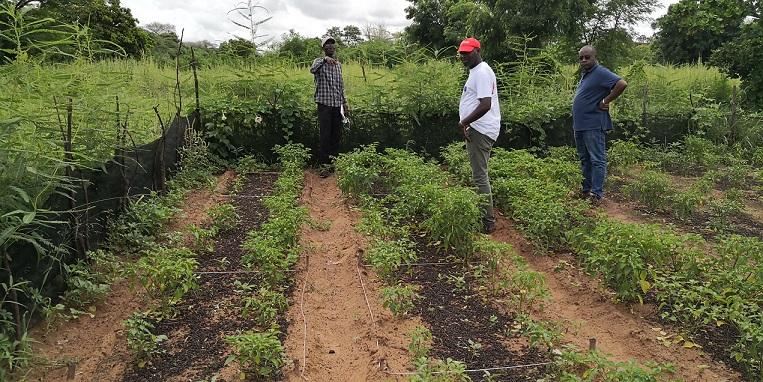- Home
- Worldwide
- CIRAD worldwide
- Projects
- VALIMAB project
Validation of beneficial indigenous microorganisms on farms in Senegal: a practice to support organic and ecological agriculture - VALIMAB

On-farm assessment of BIMs in a vegetable plot, Senegal © P. Fernandes, CIRAD
Issues
In Senegal, vegetable crops are produced by family farmers and supply local and national markets with fresh, perishable goods. However, the high added value of these crops, along with their high sensitivity to crop pests, lead producers, who often lack technical support, to adopt unsustainable farming practices. These rely heavily on imported chemical inputs (fertilisers, pesticides) and expose farmers and their families, their environment and their consumers to multiple pollutants (including pesticides that are now banned in Europe).
At the same time, the expectations of consumers concerned about their health have stimulated the development of niche markets for organic vegetables. But the additional production costs, combined with yield losses, make these products difficult or impossible to access for the most vulnerable families. Yet healthy vegetables are essential components in the fight against malnutrition in Sub-Saharan Africa, and should be available as a priority to women and young children. Indeed, current diets, which lack diversity, and poverty expose the most vulnerable populations to serious micronutrient deficiencies.
In this context, it is essential to propose alternative agroecological techniques for producers, whether conventional or organic. The use of beneficial indigenous microorganisms (BIMs) is an interesting option.
Description
Beneficial indigenous microorganisms (BIMs) are a robust, multi-purpose technology, which has already been tested in Latin America and Southeast Asia, but is still relatively unknown in Sub-Saharan Africa. BIMs are based on the principle of multiplication, through simple on-farm fermentation, of indigenous microorganisms collected locally from forest litter in areas with little or no human intervention, which should be microbiologically diverse (forest litter). This functional biodiversity is then reintroduced into agricultural plots that are often biologically depleted.
The goal of VALIMAB is to search within a wide range of local/endogenous forest litters for indigenous microorganisms that are beneficial for plants and to assess the effectiveness of these BIMs on farms. The project thus has two parts:
- The microbial and biochemical characterisation of BIMs produced under local conditions and of their variability,
- Agricultural assessments on conventional and organic vegetable farms.
Expected changes
The project will:
- Assess the effectiveness of BIMs in terms of biostimulation, biofertilisation and bioprotection, as well as the post-harvest preservation of vegetable crops;
- Validate the generic nature of their effects in different sub-regions of Senegal and disseminate the technology within the target groups;
- Understand the composition of the microbiome of BIMs, from their preparation after extraction from forest litter to their use, and thereby also ensure the safety of BIMs (absence of pathogen microorganisms) for humans, plants and animals;
- Assess the lifetime of BIMs in order to provide appropriate recommendations;
- Reduce the use of pesticides and mineral fertilisers by conventional farmers.
Expected impacts
Through VALIMAB, an agroecological innovation based on the use of BIMs as an alternative to pesticides and mineral fertilisers will be validated. This type of innovation will lead to environmentally friendly agriculture.
























